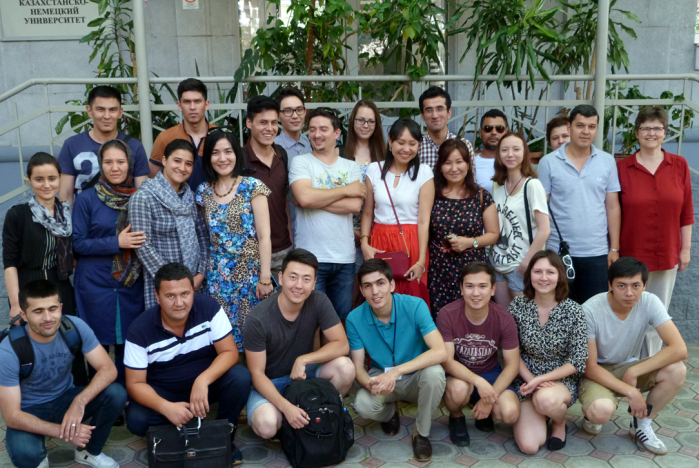22 Young Scientists trained in 3rd CAWa Summer School
The 3rd Summer School "Methods and Tools for the Assessment and Monitoring of Central Asian Water and Land Resources - From field measurements to spatial analysis" took place at the German-Kazakh University in Almaty 6-18 June 2016. Overall 22 young master and PhD students as well as young specialists from government agencies and research institutions from six countries participated in the two-week training.
Summer School Programme
The Summer School introduced scientific concepts, methods and tools for the analysis and monitoring of water and land resources in Central Asia. These methods are of great value in a framework of integrated water and land resources management.
The 2-week Summer School combined theoretical lectures and practical exercises with discussion sessions on the implementation of new methods and tools in managing water and land resources in Central Asia. The programme included:
- an introduction to geographical-informational systems using the open-source software QGIS,
- an overview on remote sensing applications for land and water resources monitoring including the presentation of the web-based tool “Water Use Efficiency Monitor of Central Asia” (WUEMoCA) being developed within the CAWa project,
- an theoretical and practical introduction to discharge measurement techniques,
- an introduction to the analysis of hydrometeorological data sets using the statistical computation environment R, as well as
- an introduction to glaciology.
Of particular use was a field trip, where participants gained a better understanding of the complexity of data collection and the uncertainties related to discharge measurements. The courses were given by German and Central Asian researchers in English with support by Russian-speaking co-trainers.
IWRM Days
One and a half day were dedicated to IWRM, its implementation in Central Asia and the role of women in it. The participants visited the workshop "Empowerment of Women in Sustainable Management of Water Resources in Central Asia and Afghanistan" organized by the US Embassy in Kazakhstan. The workshop provided an opportunity to the participants to get an insider perspective into the issue of engagement and empowerment of women in Central Asia and Afghanistan. The aims of the workshop were to improve inter-governmental and transboundary collaboration among women scientists, engineers, managers, and policy makers and to help empower women in critical decision making regarding access to water and enhancing job opportunities, as well as raise awareness of young water specialists of Central Asia on the issues regarding women and water. The results of the workshop were a call for action with targeted activities and associated outcomes for engagement of women in the region, creation of a new regional network of women, and more active inclusion of young women from Central Asian countries and Afghanistan, who were participating in the Summer School, into discussion of these issues.
The participants also had a chance to participate in an interactive exercise facilitated by Mr. Rati Japaridze, Economic and Environmental Officer of the OSCE Programme Office in Astana. Under the facilitation of Mr. Japaridze the participants were simulating negotiations over transboundary rivers which was particularly interesting given the national backgrounds of the participants. This exercise provided an opportunity to take a look at the transboundary issues from a different perspective.
The Summer School was organized in the frame of the German Water Initiative for Central Asia (“Berlin Process”), which has been launched by the German Federal Foreign Office in 2008 and is being implemented by DKU, the GIZ Transboundary Water Management in Central Asia Programme and the CAWa project. The 2016 Summer School was co-funded by the OSCE Programme Office in Astana.
Submitted by Katy Unger-Shayesteh on
